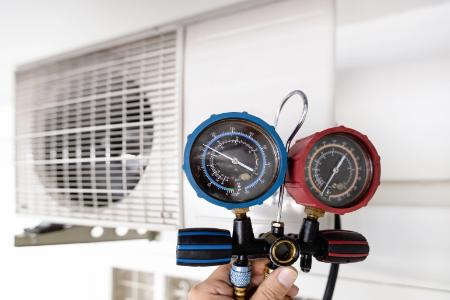The Refrigerant Update: Time to Service and Plan for Replacement

With new environmental standards set to take effect on January 1, 2025, many homeowners and businesses with older HVAC systems are facing critical decisions regarding their cooling equipment. The Environmental Protection Agency (EPA) will mandate that all new residential and light commercial air conditioners and heat pumps use environmentally friendlier refrigerants. Specifically, the commonly used R-410A refrigerant will no longer be included in newly manufactured equipment due to its high global warming potential (GWP). If you have an older system that relies on R-410A, it's essential to act soon by scheduling maintenance and preparing for an eventual ac replacement to keep your system compliant and efficient.
Why is R-410A Being Phased Out?
R-410A has been widely used in residential and commercial systems for its efficient cooling properties. However, its environmental impact has led to concerns. R-410A contributes to the greenhouse effect, and as part of global efforts to reduce GWP, the EPA has restricted its future use in newly manufactured equipment. Instead, the HVAC industry will adopt newer, lower-GWP refrigerants such as R-32 and R-454B, which have a significantly reduced impact on the environment.
What This Means for Your Older HVAC System
If your HVAC system still uses R-410A, this update doesn't mean an immediate end to your unit's functionality. However, as supplies of R-410A are gradually reduced, refrigerant costs are expected to rise. The phaseout also means that getting older systems serviced and recharged in the long term could become costlier and more challenging. The most immediate action is to schedule a service check for your current system. This check-up will help ensure it's functioning efficiently and determine whether refrigerant levels need topping off before the transition impacts availability.
Preparing for Replacement
Beyond the current service, it's wise to start planning for a replacement if your system is nearing the end of its lifespan. An average HVAC system typically lasts 10–15 years; older systems may be less efficient, with a higher energy bill and more frequent repairs. New systems using environmentally friendly refrigerants help meet EPA standards and are designed for better energy efficiency, lower operating costs, and a reduced environmental footprint.
Benefits of Upgrading Your HVAC System
While replacing an HVAC system is an investment, newer systems offer benefits that make the cost worthwhile. Upgraded systems provide improved cooling efficiency, which translates into lower utility bills. Newer units are also generally quieter, equipped with more advanced technology, and require less maintenance.
Don't Wait – Schedule Your HVAC Service Today
To avoid a rushed or costly replacement, begin planning now. Whether for a simple check-up or an installation consultation, taking action early can save you money and hassle. By preparing now, you'll be ready for the EPA's 2025 refrigerant transition and ensure that your cooling system keeps running smoothly into the future.

Don't Hesitate, Schedule Your Battle Creek Heating Repair Services Now!


